- Home
- Jerry B. Jenkins
Mark's Story Page 10
Mark's Story Read online
Page 10
“Not that I have already attained, or am already perfected; but I press on, that I may lay hold of that for which Christ Jesus has also laid hold of me. Brethren, I do not count myself to have apprehended; but one thing I do, forgetting those things which are behind and reaching forward to those things which are ahead, I press toward the goal for the prize of the upward call of God in Christ Jesus.
“Therefore let us, as many as are mature”—and here he glanced at Mark, making him redden—“have this mind; and if in anything you think otherwise, God will reveal even this to you. Nevertheless, to the degree that we have already attained, let us walk by the same rule, let us be of the same mind.
“For our citizenship is in heaven, from which we also eagerly wait for the Savior, the Lord Jesus Christ, who will transform our lowly body that it may be conformed to His glorious body, according to the working by which He is able even to subdue all things to Himself.”
Mark felt as if he were listening to a sermon from Peter, yet this man had a different style, a rush of organization and logic that made him as compelling as Mark’s mentor.
“Brothers, I implore you: I would that you would see me as one of you, a coworker in the kingdom of God through Christ.”
Peter and James sat silent, trading glances. Mark was convinced, and he believed they had to be also. Soon Peter stood and reached for Saul, calling him “My brother,” and embraced him, welcoming him to their work.
Soon Saul spoke boldly in Jerusalem in the name of the Lord Jesus, amazing all, especially the rulers and the Hellenists—the same ones Stephen had debated. Now Saul became their target, but when the disciples found out, they brought him to Caesarea and sent him back to his hometown of Tarsus for his own protection.
Mark heard nothing more of Saul for several years, but much discord arose among the brethren in Jerusalem to occupy the young man’s time.
THIRTEEN
Soon it was reported that the new churches throughout all Judea, Galilee, and Samaria enjoyed peace and were edified. Peter said they were walking in the fear of the Lord and in the comfort of the Holy Spirit, and that’s why they were multiplying.
Mark always loved when the disciples returned from their missionary trips, for they had story after story. Peter told of visiting the saints in Lydda, where he said he found a man named Aeneas, who had been bedridden and paralyzed eight years. “I said, ‘Aeneas, Jesus the Christ heals you. Arise and make your bed.’ And he arose immediately. Mark, do you know that all who dwelt at Lydda and Sharon saw him and turned to the Lord.”
“All?”
“I speak the truth, son. Is there anyone you know who would not be persuaded if they saw a man ill for eight years suddenly become whole?”
Mark shook his head. “Peter, you must allow me to accompany you on one of these missions, and soon.”
“You’ll want even more to come along when you hear what took place at nearby Joppa. A disciple named Tabitha was full of good works and charitable deeds, but the news came to me that she had fallen ill and died. They had washed her and laid her in an upper room, and the disciples sent two men for me, most urgently imploring me not to delay.
“When I arrived, all the widows stood weeping, showing the tunics and garments Tabitha had made. I asked them all to leave, and I knelt and prayed. Then I said, ‘Tabitha, arise.’ And she opened her eyes, and when she saw me she sat up, alive. The news spread all through Joppa, and many believed on the Lord.”
“So she was not dead, but merely very ill?”
“Oh, she was quite dead when I ministered to her. Surely you do not doubt the Lord’s power after all you have seen.”
“To be used in such a way—”
“You say well, ‘to be used.’ This is not of myself, hardly of my own power, of which I have none aside from the Holy Spirit. A few days later I was staying with a tanner named Simon, and I went upon the house top to pray at about the sixth hour. I became very hungry, but while a meal was being made ready, I fell into a trance and saw heaven opened and an object like a great sheet bound at the four corners descending to me. In it were all kinds of four-footed animals, wild beasts, creeping things, and birds of the air. And a voice came to me and said, ‘Rise, Peter; kill and eat.’
“But I said, ‘Not so, Lord! For I have never eaten anything common or unclean.’
“And a voice spoke to me a second time, ‘What God has cleansed you must not call common.’ This happened three times, and the object was taken up into heaven again.
“Now while I was wondering what this vision meant, behold, some men stood before Simon’s gate, and they called and asked whether I, Peter, was lodging there. The Spirit said to me, ‘Behold, three men are seeking you. Arise, go down and go with them, doubting nothing; for I have sent them.’
“I went down and said, ‘I am he whom you seek. For what reason have you come?’
“And they said, ‘Cornelius the centurion, a just man, one who fears God and has a good reputation among all the nation of the Jews, was divinely instructed by a holy angel to summon you to his house, and to hear words from you.’ I invited them in and lodged them.
“The next day I went away with them, and some brethren from Joppa accompanied me. The following day we entered Caesarea, where Cornelius was waiting and had called together his relatives and close friends. As I was coming in, Cornelius fell at my feet and worshiped me. I said, ‘Stand up; I myself am also a man.’ You see, Mark, we must be diligent in realizing that all these signs and wonders come solely from the Lord.”
“Is it possible he would ever bestow such on me?” Mark said.
“Why not? As I talked with Cornelius, I went in and found many who had come together. I said, ‘You know how unlawful it is for a Jewish man to keep company with or go to one of another nation. But God has shown me that I should not call any man common or unclean. Therefore I came without objection as soon as I was sent for. I ask, then, for what reason have you sent for me?’”
“You have always maintained ceremonial distance from the Gentiles.”
“I have. But Cornelius said, ‘Four days ago I was fasting, and at the ninth hour I prayed in my house, and behold, a man stood before me in bright clothing, and said, “Cornelius, your prayer has been heard, and your alms are remembered in the sight of God. Send therefore to Joppa and call Simon here, whose surname is Peter. He is lodging in the house of Simon, a tanner, by the sea. When he comes, he will speak to you.” So I sent to you immediately, and you have done well to come. Now therefore, we are all present before God, to hear all the things commanded you by God.’
“I said, ‘In truth I perceive that God shows no partiality. But in every nation whoever fears Him and works righteousness is accepted by Him. The word which God sent to the children of Israel, preaching peace through Jesus Christ—He is Lord of all—that word you know, which was proclaimed throughout all Judea, and began from Galilee after the baptism which John preached: how God anointed Jesus of Nazareth with the Holy Spirit and with power, who went about doing good and healing all who were oppressed by the devil, for God was with Him. And we are witnesses of all things which He did both in the land of the Jews and in Jerusalem, He whom they killed by hanging on a tree. Him God raised up on the third day, and showed Him openly, not to all the people, but to witnesses chosen before by God, even to us who ate and drank with Him after He arose from the dead. And He commanded us to preach to the people, and to testify that it is He who was ordained by God to be Judge of the living and the dead. To Him all the prophets witness that, through His name, whoever believes in Him will receive remission of sins.’”
“You said all this to Gentiles?”
“Absolutely, and while I was still speaking, the Holy Spirit fell upon all those who heard the word. And those of the circumcision who believed were astonished, as many as came with me, because the gift of the Holy Spirit had been poured out on the Gentiles also. For they heard them speak with tongues and magnify God.
“I told them, ‘Can
anyone forbid water, that these should not be baptized who have received the Holy Spirit just as we have?’ And I commanded them to be baptized in the name of the Lord.”
MARK WAS NOT SURPRISED when controversy arose among the brethren in Jerusalem when they heard that Peter had preached the gospel of Christ to Gentiles. Some contended with him, saying, “You even ate with them!”
Peter told them of his vision while praying in the city of Joppa and how the Lord had instructed him, “What God has cleansed you must not call common.” He told of Gentiles coming to faith, “and I remembered the word of the Lord, how He said, ‘John indeed baptized with water, but you shall be baptized with the Holy Spirit.’ If therefore God gave them the same gift as He gave us when we believed on the Lord Jesus Christ, who was I that I could withstand God?”
Those who heard this at first fell silent, then glorified God, saying, “Then God has also granted to the Gentiles repentance to life.”
It seemed to Mark that the whole world was beginning to hear the gospel, as far as Phoenicia, Cyprus, and Antioch. But up until then, those scattered after the death of Stephen had been preaching the word to no one but the Jews. Now the hand of the Lord was with them, and a great number of Jews and Gentiles believed and turned to the Lord.
Mark knew he should be overjoyed for Barnabas when he was sent by the disciples to minister at Antioch in Syria, a prosperous and growing body consisting primarily of Gentiles. And part of Mark was excited for his cousin. But again, that he was still tied to his mother and his home made him envious of all Barnabas would experience. His cousin soon wrote to Mark that he had arrived to see the grace of God on the people and was glad to encourage them all that with purpose of heart they should continue with the Lord. When Mark showed the letter to Peter, the disciple said Barnabas was “a good man, full of the Holy Spirit and of faith.” How Mark wished he could act out his faith in such a way that the same could be said of him.
Soon word came that Barnabas had found the work in Antioch so demanding for its fast growth that he had departed for Tarsus to ask Saul to join him. For a whole year they worked together in the church at Antioch and taught a great many people. Barnabas wrote Mark that their detractors referred to them derisively as “Christians.”
The disciples in Jerusalem began sending prophets to Antioch. One, Agabus, prophesied a great famine throughout the world, so the disciples, each according to his ability, sent relief to the brethren dwelling in Judea. They had much of it delivered personally by Barnabas and Saul, so occasionally Mark got to see them.
MARK AND HIS MOTHER had for more than ten years since the death, burial, and resurrection of Jesus feared the prospect of living so close to the dwelling place of King Herod, and it wasn’t long before he had plainly had enough of the Christians. After many warnings and threats and decrees, the wicked king finally acted and had James, the brother of John, arrested.
Peter seemed intensely stressed over this, and Mark found himself in the unusual position of trying to encourage his mentor. “Herod cannot hold a true man of God, let alone harm him,” he said. “Remember how the Spirit released you and allowed you to preach in the face of prohibitions from the rulers.”
“I’m praying,” Peter said, “but let us not be naïve. Stephen was not spared, and Herod seems deeply angry, furious with us all. James would be a tremendous loss to our cause.”
Mark, old enough now to be more familiar with Peter, threw an arm around the big man’s shoulders. “Is it naïveté or faith to trust that God will spare our beloved brother?”
“We will know tomorrow,” Peter said. “But we must not make ourselves conspicuous at the hearing.”
“Everyone knows you, Peter. You will not be able to attend unless in disguise.”
“Even then I would probably be noticed, Mark. Would you go for me and bring a report?”
“I will go for you and bring you James!”
“Please, son, do not take this matter with a light heart. If indeed you deliver our beloved brother back here, we will rejoice with great gladness. But until then, be sober and fervent in your prayers.”
Mark spent the evening allowing himself to imagine that being there when James was spared might gain him even greater entrée into the disciples’ inner circle. Would they ever see him as an equal brother, as they clearly saw Barnabas? Was it too much to ask that he be naturally included on some mission to spread the gospel?
Excitement made him feel like a lad again and cost him precious sleep. In the morning he hurried to the palace in a bulky, hooded robe that would make him less obvious in the milling crowd. When he saw the throng, clearly consisting mostly of angry men who too seemed to have run out of patience with the Christians, for the first time Mark allowed himself the dread Peter must have been feeling. There seemed an air of expectancy, a bloodlust. Mark was suddenly transported back to the stoning of Stephen and prayed he would not have to endure another such spectacle.
He knew James to be a bold witness, if not as frank and direct as Peter. The man had ministered to the poor and the lame, healing and preaching the gospel earnestly. Mark could only hope he would be given a chance to defend himself, for he could be as articulate as any of the disciples, and the Spirit would surely use his words to affect many.
But when James was dragged out to the public court—to the celebration of most of the crowd—it was clear he had already suffered. His face was purple and swollen and his robe matted with blood. He limped and winced, but often he raised his hands—roped at the wrists—and appeared to pray as he looked up.
When King Herod emerged with his entourage to the sound of blaring trumpets, the crowd went wild, cheering and clapping and shouting, “Hail to the king!”
They quickly fell silent when the scowling man held up a hand, then readjusted his cape across his shoulders. Servants held a shade over him to block the glaring morning sun.
“James bar Zebedee has been tried and found guilty of insurrection and disobeying the decrees of the throne, offenses punishable by death.”
No! Lord, spare him! Perform a miracle! Free him!
As the bloodthirsty crowd roared anew, Herod intoned, “Without further ado, the crown directs the executioner to slay the guilty with the sword.”
James did not move, let alone cower or recoil. With his eyes still toward heaven, he lowered his hands to his waist as soldiers approached from either side to hold his elbows and steady him. The executioner wielded a heavy, two-edged sword that shone under the cloudless sky. And with barely a pause, the man swung the blade two-handed, piercing James’s chest with a vicious crack, exposing his heart. As the man of God dropped to his knees, the soldiers on either side, blood-spattered themselves now, held him steady as the killing blow caught him just above his left ear and the great weapon cleaved his skull all the way to his nose.
As the crowd surged and ranted, Mark burst into tears and ran for his home. He tore up the stairs to the upper room, where the disciples waited. “What news?” Peter said, his face showing that he knew from Mark’s tears.
“Put to the death by the sword,” Mark rasped, collapsing to a bench. The rest of the disciples, as one, fell to their knees, weeping and mourning. All Mark could think of, besides the horrific gore he had witnessed, was what this would mean to all their futures. The Jews in Jerusalem seemed overjoyed and sang the praises of the king, and rumors soon abounded that Peter would be next.
Mark and his mother and the rest prayed fervently for Peter’s safety, but during the Days of Unleavened Bread, Peter was also seized and thrown into prison. The king announced that four squads of soldiers would guard him—two chained to him in the cell and two more outside his cell, rotating around the clock. Herod intended to bring him before the people after Passover.
The remaining disciples and several others of the brothers and sisters stole away to Mark’s home, and he had never seen such fear since the crucifixion of Jesus. Dozens of the believers knelt with him and his mother and cried out to God in behalf o
f Peter.
While they were praying, Rhoda, the servant girl, burst into the house and said, “Peter stands before the gate!”
“What?” many said. “You’re mad! You are beside yourself!”
“No, it’s true! I recognized his voice. It is he!”
“No,” others said, “it is his angel.”
But Mark heard continuous knocking, and when he went to open the gate, he was astonished to see Peter himself. Many cried out, but Peter motioned to them to keep silent. They bade him come in and sit and asked what had happened.
“I was sleeping, bound with chains between two soldiers, and suddenly an angel of the Lord stood by me, and a light shone in the prison. The angel struck me on the side and raised me up, saying, ‘Arise quickly!’ And my chains fell off my hands. The angel said, ‘Gird yourself and tie on your sandals and follow me.’
“I thought I was seeing a vision until we were past the first and the second guard posts and came to the iron gate that leads to the city. It opened of its own accord, and we went out and went down one street, and immediately the angel departed from me. I realized then that the Lord had sent His angel and delivered me from the hand of Herod and from all the expectation of the Jewish people. Now go, please, and tell these things to Jesus’ brother James and to the brethren.”
At daybreak Jerusalem was alive with the news that when Herod searched for Peter and did not find him, he had the guards put to death. By now, of course, Peter had departed Jerusalem and would return only infrequently and in secret.
As for Herod, he had been feuding with the people of Tyre and Sidon, so they came to him asking for peace. Mark knew it was because they relied on the king for their supplies of food. Herod, arrayed in royal apparel, sat proudly on his throne and gave an oration to them. And the people kept shouting, “His is the voice of a god and not of a man!”

 The Betrayal
The Betrayal The Valley of Dry Bones
The Valley of Dry Bones The Minions of Time
The Minions of Time Wild Rescue
Wild Rescue Though None Go with Me
Though None Go with Me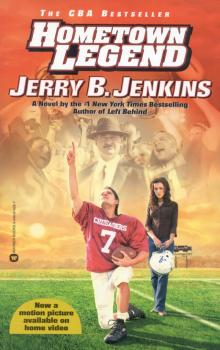 Hometown Legend
Hometown Legend The Breakthrough
The Breakthrough The Youngest Hero
The Youngest Hero Nicolae High
Nicolae High Through the Flames
Through the Flames The Brotherhood
The Brotherhood Grave Shadows
Grave Shadows The Changeling
The Changeling Shadowed
Shadowed Precinct 11 - 01 - The Brotherhood
Precinct 11 - 01 - The Brotherhood Second Chance
Second Chance Silenced
Silenced The Vanishings
The Vanishings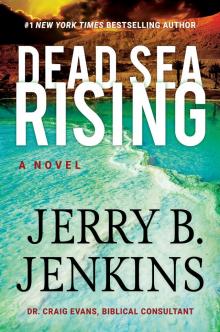 Dead Sea Rising
Dead Sea Rising Soon
Soon The Author's Blood
The Author's Blood The Sword of the Wormling
The Sword of the Wormling Left Behind - The Kids 02 - Second Chance
Left Behind - The Kids 02 - Second Chance Haunted Waters
Haunted Waters The Underground
The Underground Mark's Story
Mark's Story Shaken
Shaken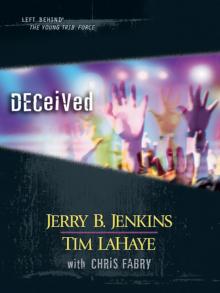 Deceived
Deceived Frantic
Frantic Riven
Riven Facing the Future
Facing the Future Stung
Stung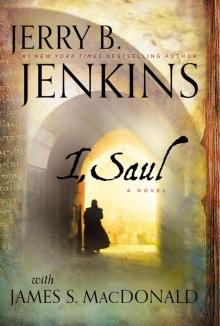 I, Saul
I, Saul Hunted
Hunted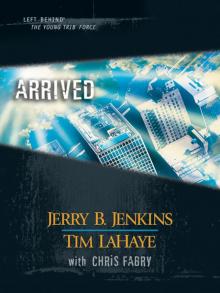 Arrived
Arrived John's Story
John's Story Stolen Secrets
Stolen Secrets